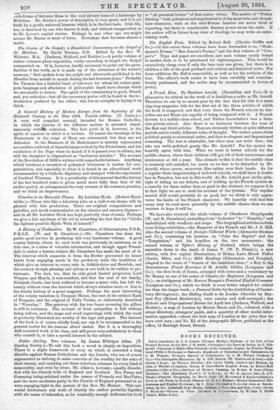A French Eton. By Matthew Arnold. (Macmillan and Co.)—It is
pleasant to be critical on the work of so fastidious a critic as Mr. Arnold Therefore we can by no means pass by the fact that his title is a mere clap-trap magazine title for the first out of the throe articles of which the book is composed, and that even there the French schools he des- cribes are not Etons nor capable of being compared with it. A French lyceum is a middle-class school, and Father Lacordairo's was a first- rate private school. Also there is no harmony between the tone of the first and third articles. They are obviously written at quite different periods and in totally different veins of thought. The author passes from polished gossip to restrained satire, and then to eloquent and impassioned reasoning. The last is admirable, but other men can write that ; but who can write polished gossip like Mr. Arnold? For his matter we heartily agree with him. What we want is better schools for the middle classes, where their children will get rid of their narrowness and intolerance at 50/ a year. The obstacle to this is that the middle class is intensely self-satisfied, too much so we fear to bo disturbed by Mr. Arnold, whose arrow, moreover, flies rather over their heads. As for a regular State inspectorship of endowed schools, we shall have it doubt- less in Paradise, but not in this world. As Mr. Arnold goes on the prin- ciple of telling us our defects, and of holding up the French system as a remedy for them rather than as good in the abstract, we suppose it is in that light we are to read his account of the lyceum. The regular mental drill would probably do us good, but we think it only aggra- vates the faults of the French character. We heartily wish that this essay may be read more generally by the middle classes than we can venture to hope it will be.
We have also received the ninth volume of Chambers's Encyclopaedia (W. and R. Chambers), extending from "Labrador" to " Numidia," and embellished with woodcuts and maps. The biographical articles include even living celebrities,—the Emperor of the French and Mr. J. S. Mill. Also the second volume of Irving's Collected Works (Alexander Strahan and Co.), containing his lectures on "John the Baptist" and the "Temptation," and his homilies on the two sacraments ; the second volume of Tytler's History of Scotland, which brings the narrative down to the death of James V. (W. P. Nimmo); a new edition, with five capital illustrations, of Holme Lee's Maude Talbot (Smith, Elder, and Co.) ; Bible Readings (Edmonton and Douglas), adapted to the wants of " women of the humblest class ;" a Key to the Instantaneous French Exercises of M. Achille Albitbs (Longman and Co.); the first book of Caesar, arranged with notes and a vocabulary by Dr. Kenny as one of his series of Classics for Beginners (Long-man and Co.); an abridgment of Mr. Roscoe Mongan's Practical English Grammar (Longman and Co.), which we think is even better adapted for school use than the larger work ; a Pastoral Letter by the Archbishop of Canter- bury (Rivingtons) ; the Shilling Guide to the London Charities by Her- bert Fry (Robert Hardwicke), very concise and well arranged ; the Eclectic and Congregational Review for April last (Jackson, Walford, and Hodder); a map of London by Messrs. Bacon and Co., coloured, with a street directory, strangers' guide, and a quantity of other useful infor- mation appended,—about the best map of London at the price that we have ever seen ; and No. XI. of the Autographic Mirror, published at the office, 13 Burleigh Street, Strand.






























 Previous page
Previous page